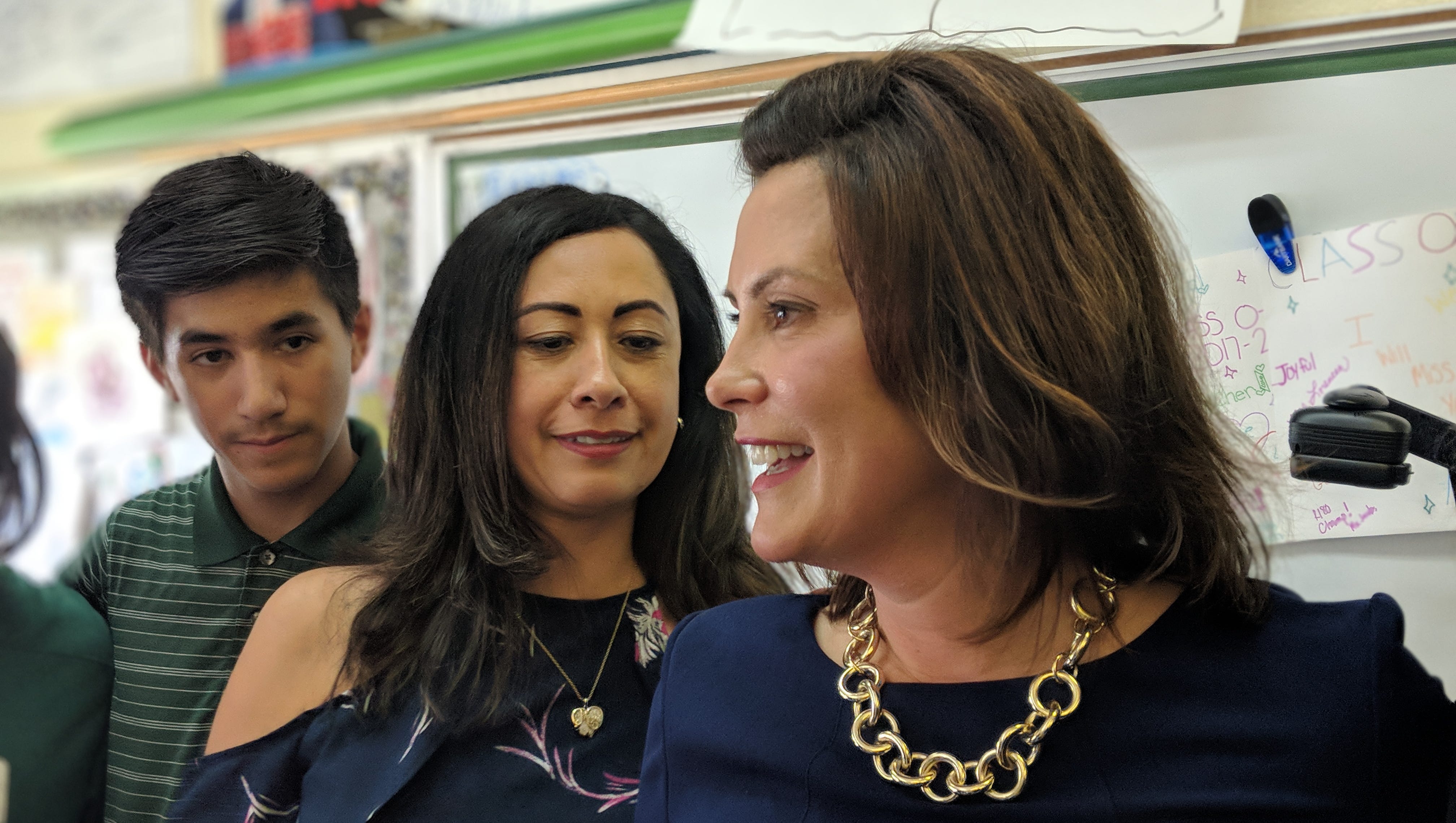Whitmer: Give Michigan teachers a raise
 Jonathan Oosting
Jonathan Oosting
Lansing — Michigan should spend more on public schools to pave the way for teacher pay raises and prohibit for-profit companies from managing additional charter schools in the state, Democratic gubernatorial hopeful Gretchen Whitmer said Friday.
Whitmer released a new 11-page education policy platform here at Lewton Elementary School, where students were attending their last day of classes before summer break.
The former Senate minority leader's proposal calls for more state spending to phase in universal preschool for a “cradle to career” education system, give districts extra money to hire additional literacy coaches, hire more counselors and potentially increase educator pay, which the state could not directly require.
“School districts don’t want to pay their teachers poorly,” Whitmer told reporters after she unveiled the plan. “They want to pay their teachers well. But the Legislature has hamstrung them from being able to do that. So greater resources helps them negotiate better salaries and also helps districts lure great talent into our schools.”
Public school teachers made an average of $62,260 in the 2016-17 school year but salaries vary considerably by district, according to data from the Michigan Department of Education.
While Michigan test scores still trail national averages, K-12 spending has increased under term-limited Republican Gov. Rick Snyder.
After an initial per-pupil funding cut, Snyder has signed budgets boosting state spending from roughly $10.8 billion in 2011 to $12.8 billion in 2016, a 20 percent increase. But some of the spending increase is dedicated for looming retirement benefit costs, and educators continue to complain about classroom resources.
“We find ways by purchasing our own materials,” said Melissa Wriggelsworth, a fourth-grade teacher at Lewton Elementary who hosted Whitmer in her classroom. “I would say probably 80 percent of what’s in here has been scraped together, purchased by myself or stolen from my own children. From the chairs, the books to art supplies — extra things that we need to do project-based learning.”
Whitmer also proposed banning guns in schools except for weapons carried by trained law enforcement professionals. The plan would require closure of a so-called open carry loophole currently under review by the Michigan Supreme Court.
The East Lansing Democrat last week unveiled plans for a scholarship program that would pay for two years of free college or training for high school graduates with good grades and attendance records.
Whitmer did not detail direct funding sources for those programs, but her education plan calls for a review of tax code “carve outs and targeted tax breaks that have starved the School Aid Fund.” She also wants the state to stop shifting K-12 school revenue to spend on public universities and community colleges.
A recent state budget agreement for 2019 would spend $500 million in School Aid Fund money on higher education. Ending the shift would create a general fund hole Whitmer said she would try to fill by negotiating with stakeholders during the annual budget process.
“I can’t do this alone, but what I can do is say: 'I’m not going to sign anything that siphons more dollars out of our education system to shore up other parts of the budget,'” Whitmer told reporters. “I don’t care what part of the budget it goes to. It’s wrong. It was not the intent of the voters, and our kids are suffering because of it.”
Proposal A of 1994 changed the way schools are funded, raising the state sales tax from 4 percent to 6 percent and creating a state education tax. That revenue now accounts for most K-12 funding.
Whitmer also wants to create a “weighted” per-pupil funding allowance to address higher costs associated with special education students, at-risk students and English language learners.
She did not propose specific changes to Proposal A but said “we owe it to the people of this state to examine whether or not it’s met its goals, and to get it right.”
Charter schools, particularly those run by for-profit management companies, remain a lightning rod in Michigan politics but are usually supported by Republican candidates for governor.
In the Democratic primary, Ann Arbor entrepreneur Shri Thanedar has said he would try to “close down and outlaw for-profit charter schools,” while former Detroit health department director Abdul El-Sayed says he wants to create “an off ramp from for-profit operators.”
Whitmer is not proposing to shut down any charter schools that contract with for-profit management companies. Instead, her plan would limit the creation of new charter schools to those with boards that either self-manage or use non-profit management firms.
Her education plan also proposes subjecting charters to the same financial, health, safety and academic oversight as traditional public schools and would require all charters to accept students of all kinds, including those with handicaps.
“If you have a profit-motive and you’re not preparing kids, you’re not going to be in business much longer,” Whitmer said. But if a charter school is “getting kids prepared and you’re accountable and transparent, then you know what, you should keep doing the work you’re doing.”
Charter schools already are subject to accountability measures by their authorizers, which can shut them down if they do not meet performance goals, said Dan Quisenberry, president of the Michigan Association of Public School Academies.
“Blaming people is not a vision for education,” he said of Whitmer’s plan, suggesting she is “playing politics” with education policy.
“No parent walks into a school and asks, “Is this a charter? Is this a traditional school? Who’s it managed by?' They want to know who the teachers are and, are you getting good outcomes?,” Quisenberry said.
Public education unions that have already backed Whitmer praised her new education platform.
It “addresses so many needs we hear from front-line educators, from greater respect for the profession to ensuring our schools foster the workforce our economy needs,” MEA President Paula Herbart said in a statement.
“Our members are motivated, energized and ready to work with Gretchen to make this education plan a reality so we can build a better Michigan for everyone. Let's get it done."
joosting@detroitnews.com